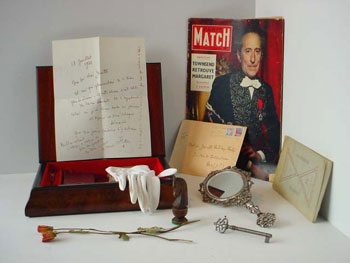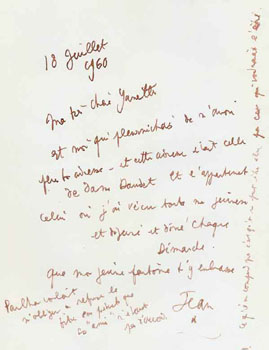|
|
 Inv.
SCC/jc-00048 Inv.
SCC/jc-00048
Orpheus
The Curator's tribute to Jean Cocteau
 They
have travelled through time since the dawn of humanity. They
have travelled through time since the dawn of humanity.
They go by many different names: poet,
storyteller, shaman, sorcerer, troubadour or magician.
We call them 'sensitives'.
They are true warriors and genuine magicians.
They are feared, even hated by some, and respected by others,
for they have stolen a spark of divine fire and their power frightens
ordinary mortals.
They are the incarnation of eternal myths - their manifestation
on earth. They accept this total servitude, for through it they are
truly free.
And after each one's brief voyage on this earth is over, humanity
has moved closer to the light. Even if that meant confronting
darkness and ignorance.
They have borne such names as Zoroaster, Dante, Da Vinci, Wolfram
von Eschenbach, Ibn Arabi, Avicennes, Sohrawardi, Attar and more.
More recent examples include Peter Brook, Hugo Pratt, Alain Thorez, Michelle Purnal and Jean Cocteau.
I have a weakness for Jean Cocteau.
My childhood was awash in the magic of Beauty and the Beast,
Orpheus and The Testament of Orpheus, all fascinating explorations
of the other side of the soul.
Jean Cocteau - a poet, painter, sculptor, filmmaker and magician -
left a legacy of inconceivable wealth, for those who know how to read
and who want to learn how to write.
It is thought that he was a grandmaster in the Order of Ormus,
linked to the Rose+Croix and, upon reading his works, I am tempted to
believe this.
I am still deeply moved by the poetry of Beauty and the Beast,
based on the tale by Mme Leprince de Beaumont.
Through his film Cocteau the mythographer pays tribute to the eternal
myth of Psyche and Eros.
Belle's voyage, during which she encounters the Beast, brings her into the
presence of five magical objects: the horse, the mirror,
the key, the glove and the rose.
The horse, a symbolic creature, represents the vehicle on which the
individual soul travels as it returns to the cosmic soul, in search of itself. In the shamanic traditions, the drum
- the shaman's horse, if you will - is
often made from horsehide.
The mirror, in which the soul can contemplate itself contemplating
itself, represents a gateway allowing one to travel from one world to
the next. In the Mazda traditions this is called daena.
The key is used to open the gate, allowing access to the
treasures of the imagination.
The glove symbolises the fleshy clothes donned by the soul
during its travels on earth, the illusion of identity.
But what about the rose?
Why not ask Cocteau himself?
After all, the essence of the poet is immortal.
We will place this mirror and a chess piece representing the
horse (the black knight) on the table.
Jean Cocteau was fond of the Bohemians, fortunetellers and the magic of the Tarot,
a pack of cards containing all questions and all answers.
 This is
not a Tarot pack in the strict sense of the term, but a book of Thoth,
the ancient Egyptian god of destiny. This is
not a Tarot pack in the strict sense of the term, but a book of Thoth,
the ancient Egyptian god of destiny.
Put on the glove and pick up this dried rose by the stem.
When you feel the need or desire, place the flower on the back of one
of these Tarot cards.
The answer will come to us in all its simplicity.
Turn the card over; it represents love. The love of a rose.
But is that really the kind of answer a poet would give?
Let's put the card on the mirror and use the key.
When held flat in the hand above the mirror, the key starts to turn
over.
The face of Orpheus drawn by an invisible hand on the other side of
the mirror appeared on the back of the card.
Cocteau's ghost was smiling down upon us.
|

